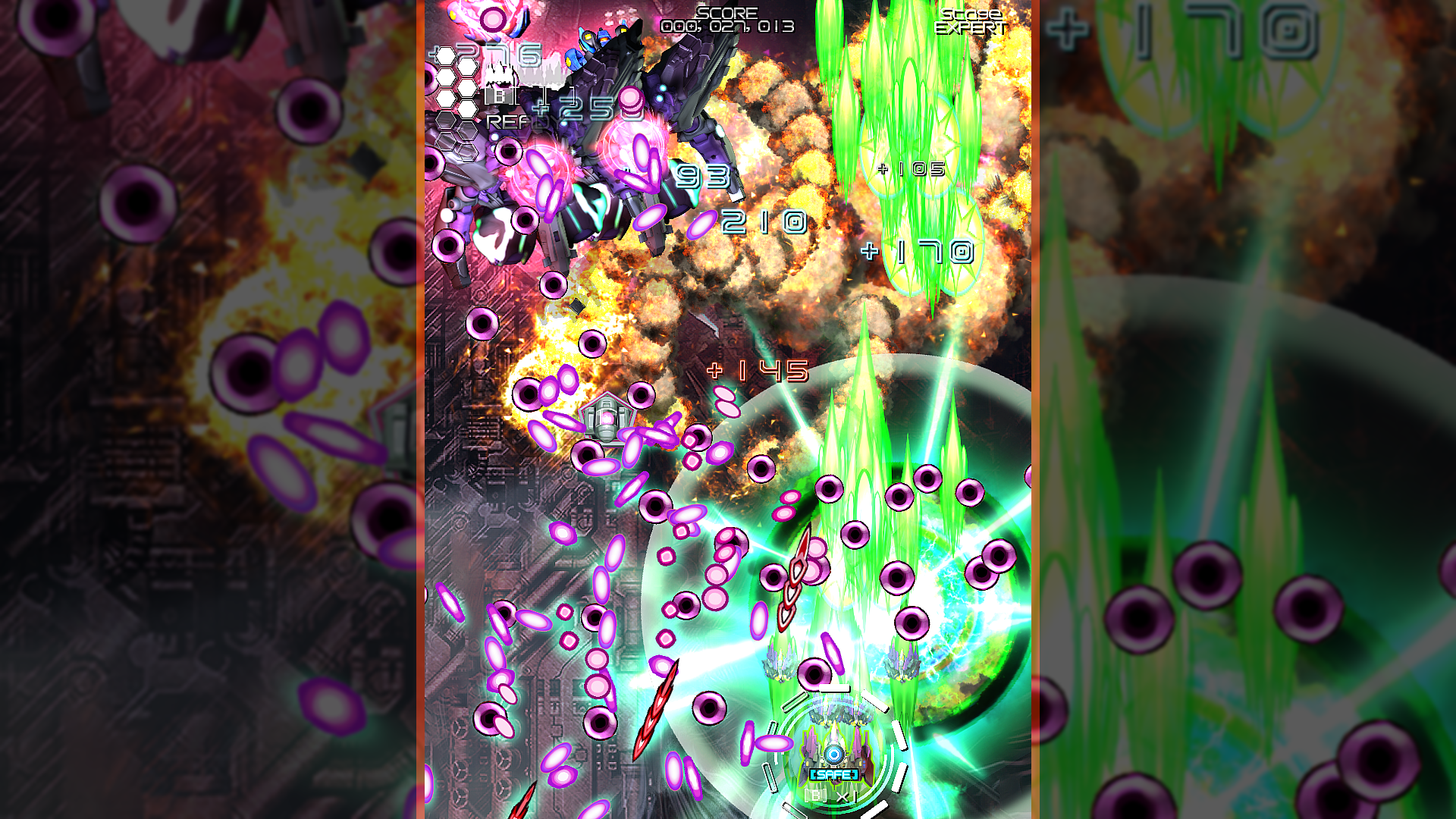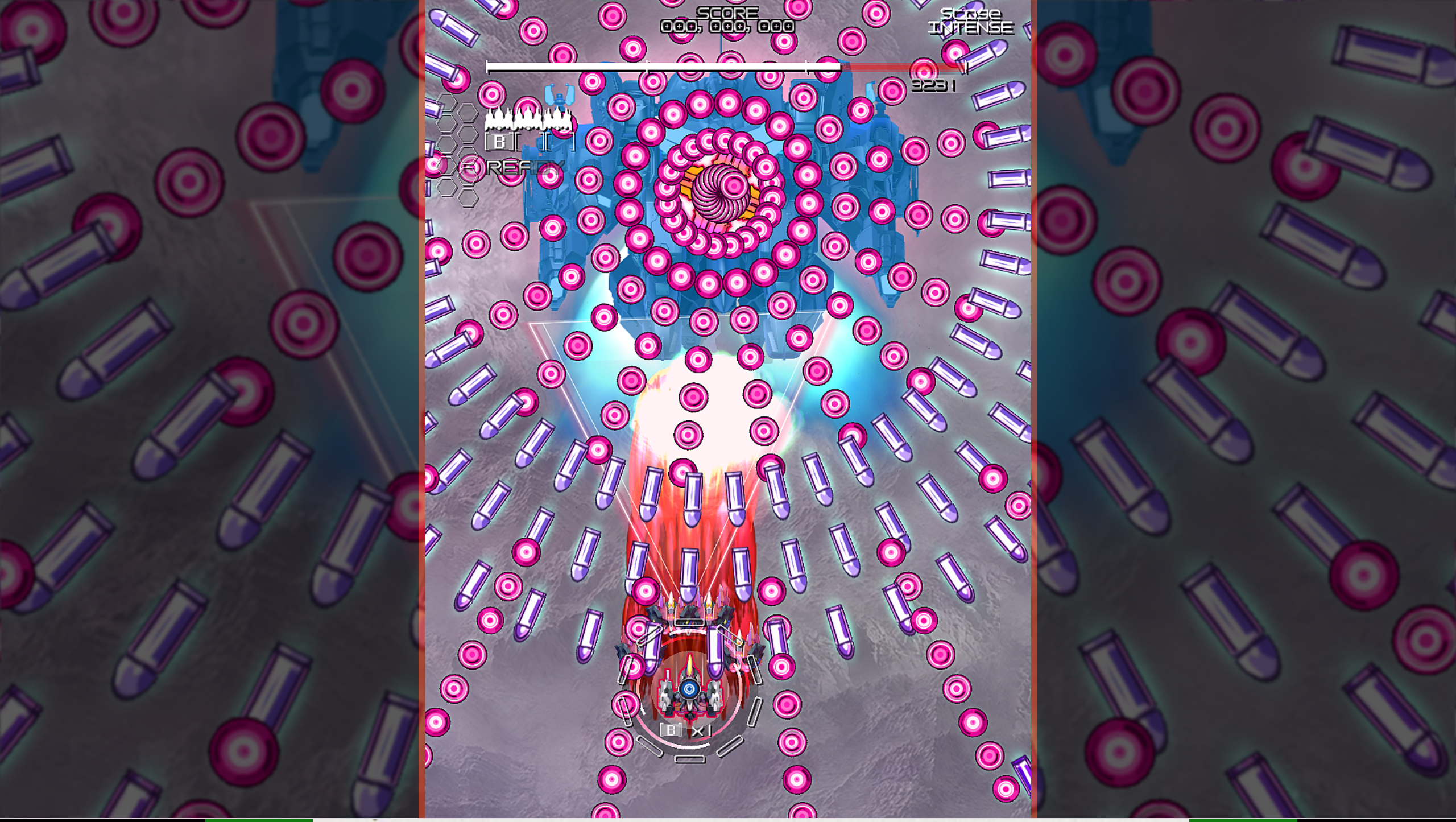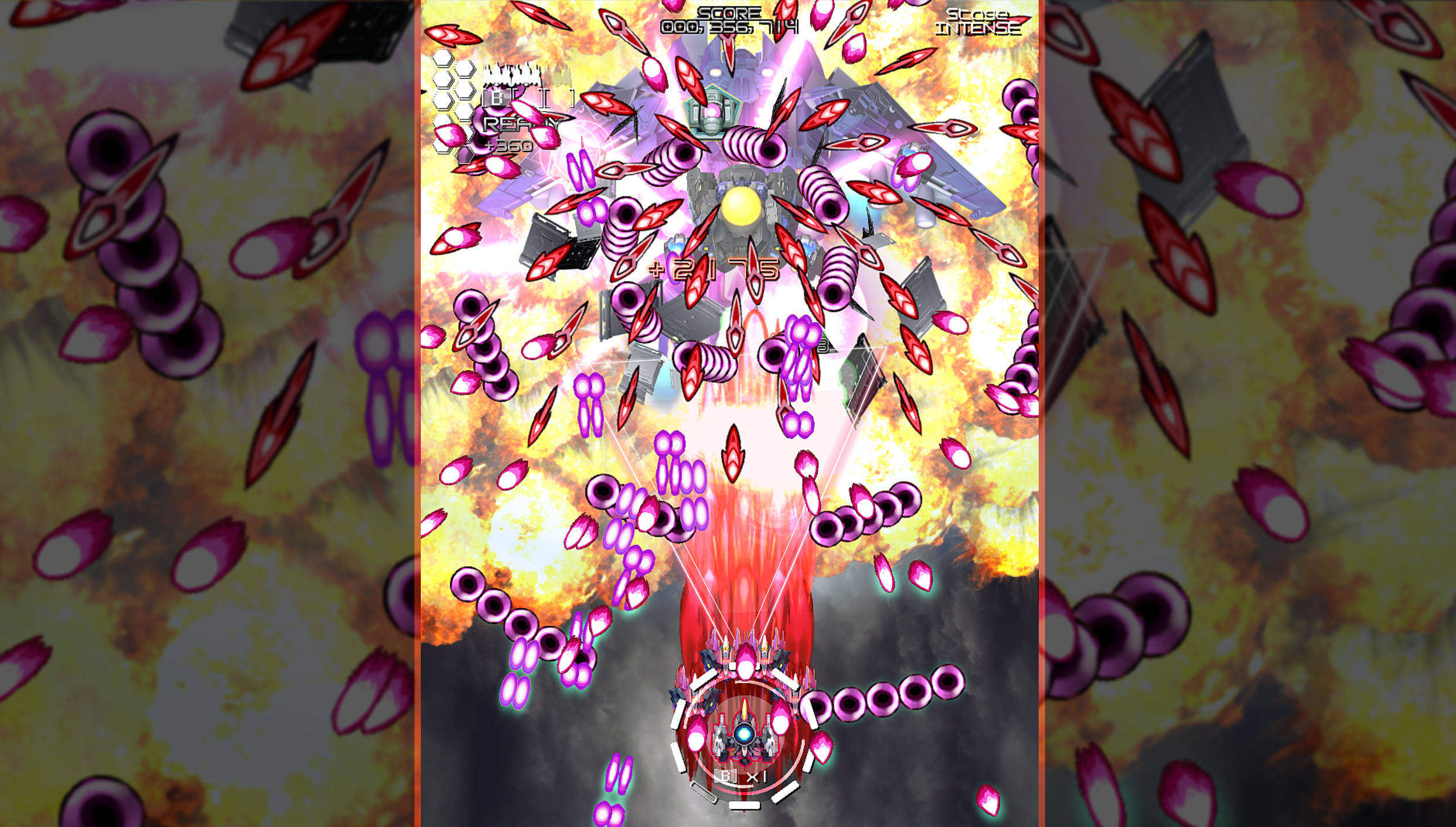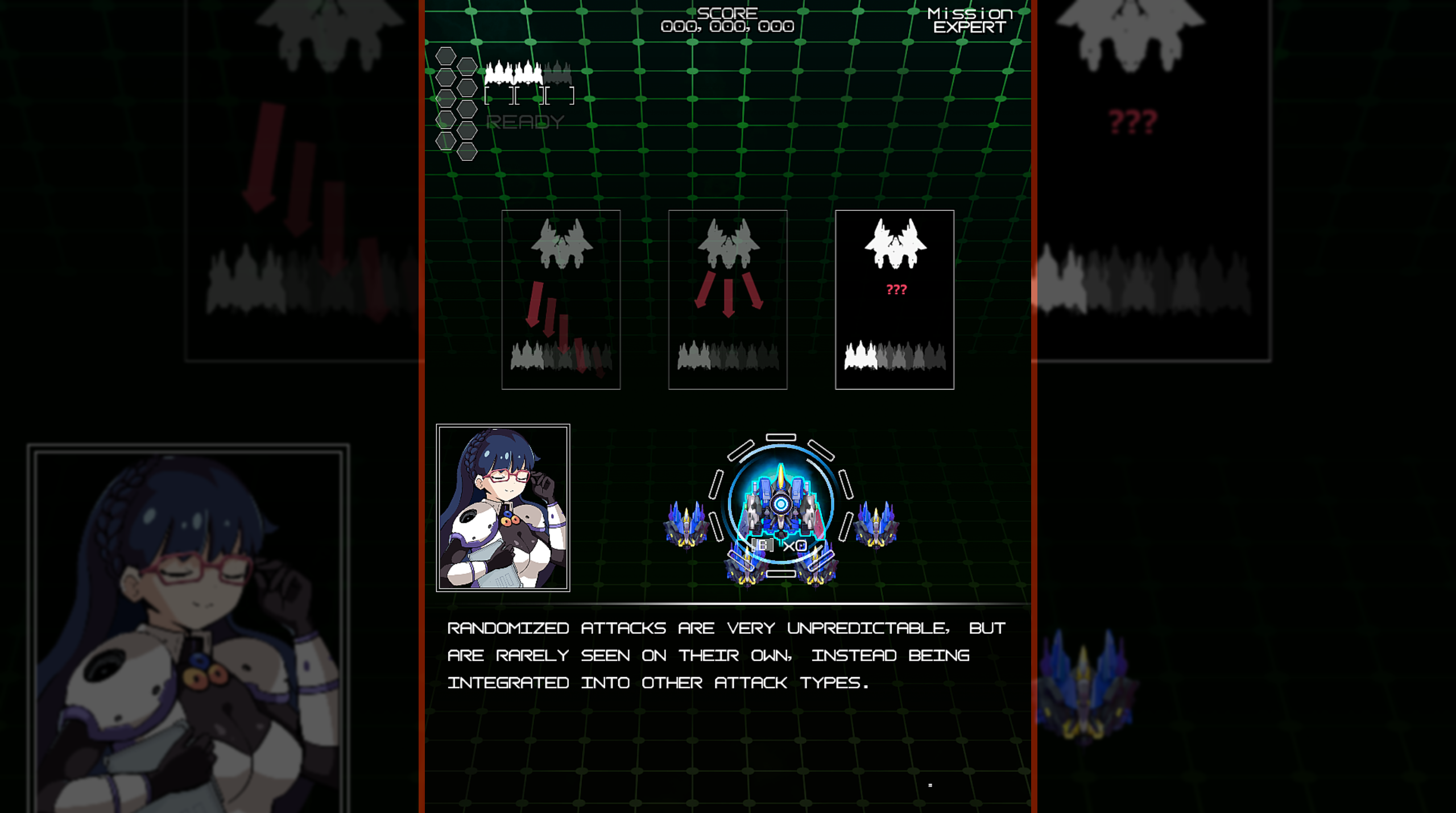Let’s be clear - Gunvein is very much a purebred bullet hell shooter. From the first stage it rarely lets up, bringing an intensity that is evocative of some of the genre’s most demanding works. This is a title openly informed by Cave heavyweights such as Ketsui and DoDonPachi SaiDaiOuJou; releases where the bullet barrage infrequently quietens between opening frame and final boss form. And yet Gunvein has something of a knack for bringing out the best in your play. Equally, it’s eagerly encouraging. Before you tackle the main game proper, it insists you take in a tutorial about the wider genre’s founding principles, introducing techniques such as managing aimed bullets, ‘cut-back re-stream dodging’, micro and macro bullet curtain navigation, and the strategic theory that informs how close you get to larger enemies. Here is not the place to spell out each of those methods, but even if you’re an old hand with a list of Cave 1CCs behind you, the tutorial provides a splendid refresher. And if you’re less of a genre devotee, yet long to get a taste of playing the most densely packed bullet hell at a capable level, Gunvein’s opening minutes will likely serve as a fitting primer, helping you think like a high level player; a mindset that reveals much of the genre’s smoke and mirrors, helping get you out of some very tight spots. Elsewhere Gunvein bristles with enthusiastic encouragement about managing frustration, and seems to have absolute faith in your ability to succeed. That’s not to say it is anything like a watered down shooting game; far from it. But rather than direct less experienced players to a diluted easy mode, it appears set on making masters out of all of us. Before delving any deeper into the game systems within, it’s very much worth considering the fundamentals on offer. NGDEV - known for its contemporary shooters for systems like the Neo Geo - collaborated with Mechanical Star Astra rising shooting game design maestro boghog to craft Gunvein, which focuses on innovating within the confines of the template established by Cave, Toaplan, Raizing and so many other studios that initially plotted out what bullet hell could be. That heritage equally informs Gunvein’s tone and visual styling, with everything from ship and bullet design to the landscape that tumbles beneath taking a bounty of cues from those classics. That’s not to say Gunvein is simply derivative. It might not be wildly distinct when it comes to aesthetics, but it puts its own contemporary spin on the iconic bullet hell look, bringing a cleaner, sharper presentation than often seen in a form where crunchy pixel art is highly popular. And while we’re talking of tone, the game’s pumping music compliments and energises the pace and sets the atmosphere, while clear, well-defined audio does a sublime job of communicating essential information to the player in the midst of the action. Need to know when your maximum allocation of homing missiles have found a suitable target, for example? A distinct sonic ping will tell you just that. On the matter of visual flair, the bullet patterns and broader level design elements here are consistently exceptional. The waves of ordnance that near-constantly occupy the screen thrive in bringing an immaculate blend of static and randomised elements, meaning that while the patterns will feel more familiar the more you play, there will always be enough variety to keep you from complacency or reliance on memorisation. They also do a great many mesmeric things that push you to be an agile, adaptable pilot. The various enemy waves, set-pieces, and arrangements of larger hostiles, meanwhile, are expertly timed and positioned, bringing a tempo and ferocity of play that is a joy to be overwhelmed by. By contrast, the otherwise brilliant boss battles can feel ever so slightly drawn out, tip-toeing on occasion into offering something of a war of attrition. With Gunvein confidently respecting the genre’s arcade roots, you get five stages hooked around a credit-based system, set across a vertically scrolling journey that has you darting above a futuristic war-torn landscape. Gunvein presents a particularly aggressive shooting experience where screen domination is the way to play, meaning adopting a frenetic, high-risk approach focussed on quick kills and presence all over the play field. It’s a thrill ride that’s profoundly rewarding, and can leave you with a sense of overwhelmed excitement for quite some time after you put the game down. Adopting the basic weapon system seen in DoDonPachi and so many others, you get a wide shot that quickly clears out smaller ‘popcorn’ enemies, and a focused, powerful laser that slows down your own ship movement while putting all the power right out in front. There’s an additional homing missile element, where you can lock clusters of aimed shots at both enemies and terrain, letting off volleys that hunt down their objective in a moment. So far, that description might fit a considerable number of other purebred bullet hell shooters - lock shot aside. But again, good shooting game design is often about innovating within the confines of the form, rather than trying to reinvent the genre. And that is where Gunvein excels. A triumph of making close conceptual bedfellows of survival and scoring play, Gunvein does things differently than most by making bombing one of the most useful devices for raking in maximum points. In so many shooting games, bombs are entirely geared towards survival, with their use commonly breaking the likes of combo chains and eradicating potential score cash-ins. But not so for Gunvein. At a fundamental level the scoring works like this. Quick kills fill a metre. Each time that metre tops out, a collectible bomb fragment is dropped. Collect enough bomb fragments, and you get a bomb. Drop a bomb, and all that are caught in - or drift into - its path are converted into a shower of large gold stars that deliver an immense number of points. And then it’s back to earning more bomb fragments, and starting the core loop again. Play with enough aggression, screen presence and risk, and you can inject enough pace into that loop to be regularly bombing and scoring. It’s a system that demands you keep on the move, keep taking risks, and play aggressively, making for a high-thrills, deeply rewarding shooting experience. Yet things are just a shade slower than as seen in Ketsui and its ilk. Even though Gunvein’s ask is high and the bullet count higher, it’s surprising just how manageable navigating the gaudy swarm can be after a fairly short period of devotion. The game itself locks its online leaderboards to ten players each. You can, meanwhile, head to Steam’s leaderboard page for the game to see all your scores. An odd decision that may seem, but the Gunvein team have clearly decided to respect the part of arcade culture that says the very best have earned the right to get particular recognition. That presents something irresistible to pursue; to get listed in the game, rather than around it. The three player ships, meanwhile, bring a generous heap of potential variety, both in terms of play feel and scoring strategy. Each has a distinct balance of firepower, speed and lock-on range. More impactfully, each also brings its own lock-on mechanic and bomb behaviour variations, from a positional mine to a wildly destructive overpowered laser. All of that means there’s plenty of different play styles and scoring strategies to explore. An easier difficulty setting does exist, though it’s certainly not patronising, while the highest difficulty should bring enough to trouble genre veterans. There is also a practice mode, and number of ‘missions’ offering the likes of short form caravan challenges and boss rush set-ups. There’s even a highly distinct roguelike arrangement included, which throws the arcade mode’s meticulous structuring out the window, randomising all manner of things, introducing an on-the-fly ship upgrade system, and providing all kinds of customisable parameters. Want to attack Gunvein on a low difficulty with a through-the-roof enemy spawn rate and no way of memorising the patterns? Roguelike arrange has you covered, and should delight those less obsessively committed to the purity of shooters. Ultimately, Gunvein takes a very familiar form. If you want something that reinvents its genre, you might want to look elsewhere. But through subtly tweaking conventions with a view to asking players to explore new approaches and strategies, it presents a truly brilliant shooting game that is always exciting, provides tremendous scoring depth to explore, and that somehow elevates your own ability. So many modern shooting games tumble from that Cave-crafted genre template. Gunvein is one of the absolute best of that vast group.




